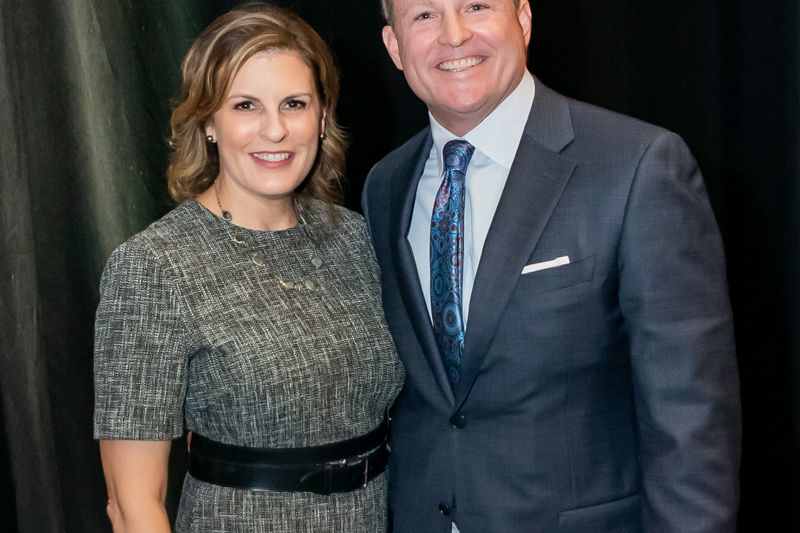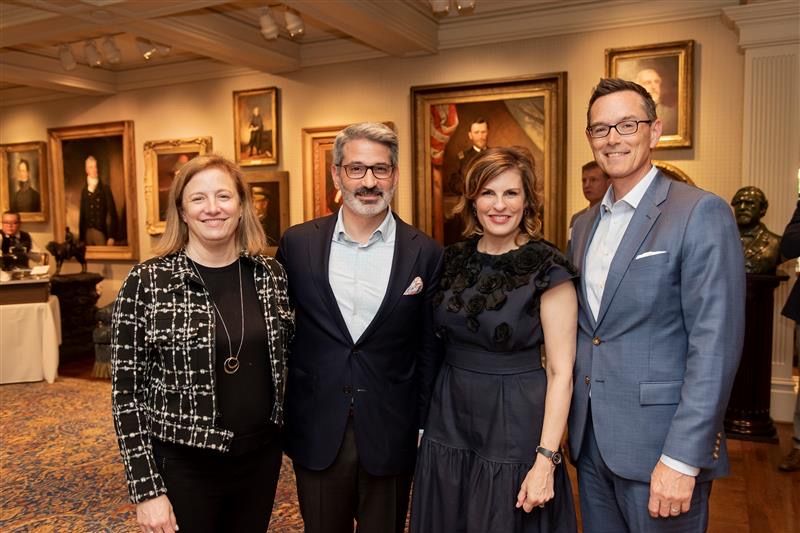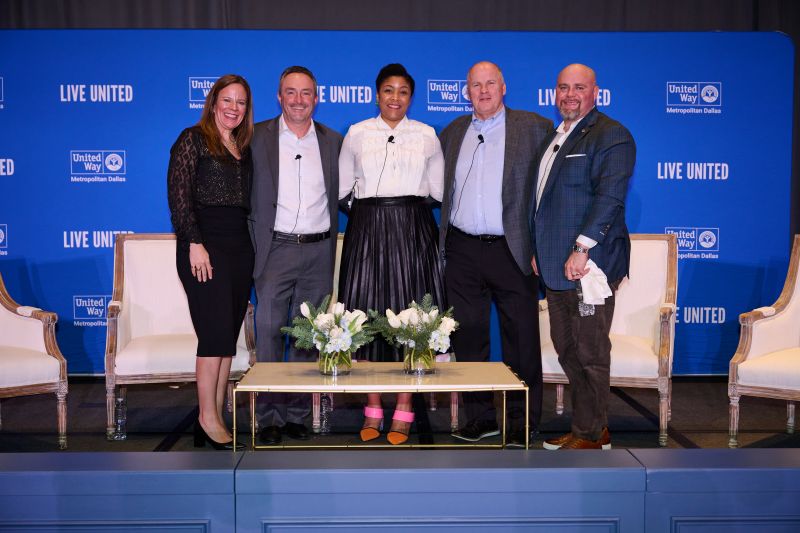Collaborating to Address Child Poverty in North Texas

At United Way of Metropolitan Dallas, addressing challenges in our community is one of the key ways we create opportunity for all North Texans to thrive. One of the key issues that we see year after year is the rate of child poverty. Today, more than 32% of children in Dallas live in poverty, which can have a lifelong impact on an individual and their family.
This is a challenge that a variety of local organizations are working to address. At United Way, we lead and invest in initiatives that create opportunity in our three focus areas—education, income and health—each of which overlap and are inextricably linked to child poverty.
Recently, the United Way Ruth Sharp Altshuler Tocqueville Society brought together some of the community leaders who are working to combat child poverty in our region for an important and engaging panel discussion. The event, held Feb. 6, featured George Kaiser, president and CEO of GBK Corporation, and Todd Williams, chairman and CEO of Commit Partnership. Susan Hoff, chief strategy and impact officer, United Way of Metropolitan Dallas at United Way of Metropolitan Dallas, served as moderator.
The panel discussion touched on a variety of important topics including:
- The state of child poverty
- Unique challenges in North Texas
- Whether there are “silver bullets” for solving challenges in education and child welfare
- The importance of collaboration
View the full event below, or read on for a few of the highlights from the conversation.
Susan Hoff: George, could you give us a brief overview of the George Kaiser Family Foundation’s work around child poverty?
George Kaiser: Our mission is equal opportunity for very young children. We focused very much on birth to 3 or even prenatal or preconceptual, because about 20 or 25 years ago, when electronic tools were coming into medical diagnostic work, they used MRIs to examine the blood flow in baby’s brains. And they learned that brain cells at birth are fully formed, but functionally undeveloped. But the experience at one day, one week, one month and one year is extraordinarily powerful. The infant brain is extremely plastic. They are smarter than we are. They just don’t have any facts. [Researchers] claim 1 million attempted synaptic connections occur every second in a baby’s brain. So that’s the reason we have the focus there. And the moral reason we have the focus there is that I cannot imagine something that is more morally compelling than the fact that an infant born into poverty has the disadvantage of most likely not realizing his or her full potential, purely because of the accident of birth—what Warren Buffett calls “winning or losing the ovarian lottery.” We felt that was morally compelling and that there was a good justification for why to do it. We then started with early childhood education, and we are the second largest sponsor of early childhood education birth to 3 in the United States. But then we learned very quickly that there is no silver bullet in social service, and that we had to do a whole bunch of other things, heavily oriented around criminal justice, teen pregnancy and several other things we’re going to talk about in a second here.
Hoff: Todd, talk a little bit about the critical importance of collaboration, and some of the challenges you’ve encountered and how you’ve addressed those challenges.
Todd Williams: I came to the conclusion relatively early that [child poverty] was too big to try and solve alone—that there were many individuals and institutions that wanted to solve this problem. But we had to try and figure out how to collectively work together to do it. Sometimes the reason I think collaboration is difficult is it’s not done historically. Sometimes people are fearful collaboration because they think it’s a zero-sum game: If you’re doing better, then the philanthropic system will reward me less. I think the beauty of what’s happened here in Dallas through partnerships with the United Way and with Commit and with Child Poverty Action Lab and many others, is that we truly have a comprehensive scale. We have built a comprehensive infrastructure. We’ve been able to show meaningful results both in the Dallas County area, but also progress at the state policy area.
Think about this: There are 3,100 counties in America, and only six counties have fewer children living in poverty [than Dallas County]. The fact that any region leads the country in job growth and leads the nation in poverty doesn’t make sense to me. But we’ve got to make sure that the jobs that are coming here, because of the business climate, etc., are also going at least proportionally to our own kids and their ability to participate in that system. We know where the system breaks down and we have to be laser focused in working with others to try and solve it collectively and put our egos at the door.
Hoff: In the field of education and child welfare, we’ve often cited some “silver bullets” for long-term outcomes. George, in your experience, are there any silver bullets? What are the most important components of success?
Williams: Yes, there are certain strategies that are probably more important than others. But for example: Just 40% of our kids meet the state standard in fourth grade reading. Is it because of pre-k enrollment or early childhood or prenatal? Is it because of where we staff our most effective teachers? Is it because that child was hungry the night before or there was trauma in the neighborhood due to gunshot violence? Is their family facing eviction, so they have to move from one school to another school during mid-year? All this stuff adds up.
So I think any attempt to solve this problem by focusing on two things or three things, you won’t get what you want to do. And I think we’ve learned to just try and be very relentless about trying to figure out what are the more important issues. Early childhood is absolutely critical. The talent and capacity that’s in the system is critical to actually effectuate the work. You have to have a legislature that really understands and is data driven and continuous improvement focus.
Hoff: George, you touched on it a bit with the Women in Recovery program. I wonder if you’d talk a little bit about public-private partnership, particularly “pay for success” models?
Kaiser: We are a big believer in pay for success—anything which saves money for some level of government and improves the outcomes for their citizenry. And if we can generate that on an entrepreneurial private sector basis, deliver it to them and they can adopt it statewide, and there is some financial sharing arrangement, that’s a win. We’ve had several of those. Women in Recovery is one example. We do now have an arrangement with state government, under which if any woman who does not backslide after our program for one to four years, they pay a portion of the cost of the program for them. Let me mention one other: During the pandemic, we’ve been doing assistance for people for many years, the earned income tax credit. If you don’t apply for it, you don’t get it. And the people who need it the most are the ones least likely to be able or knowledgeable about applying for it. So we trained, I think, literally thousands of people in all kinds of government programs, the new ones and the old ones. And then we got together with all the social service agencies and said, refer people to us. It’s called Tulsa Response. And we helped several thousand people apply for grants or assistance in a series of areas. And Todd, I think you’ve been doing the ITC and similar work, have you not?
Williams: Between ourselves and the Child Poverty Action Lab, which is a fellow backbone in this work, focusing on community factors, we convene about 25 different CEOs on a quarterly basis: school district superintendents, city managers, county judge, Parkland Hospital, DART, etc. Collectively, those CEOs control about $13 billion in annual public funding. In that analysis, we’ve discovered that effectively about $1 billion of legislatively appropriated funding has been approved by the state or the federal government that is not being accessed by the citizens of Dallas County every year: $400 million in SNAP benefits, $150 million in Pell grants, $100 million in pre-K enrollment dollars, $115 million in CCMR success funding, which we and many others in this room helped create that legislation back in 2019.
So part of what we’re very focused on is, how do we access that funding? How do we make sure that funding is spent smarter? Because ultimately this is what makes it sustainable. Because you’re never going to solve the problem of economic mobility solely through philanthropy. You’ve got to figure out how to get public funding to work smarter and more effectively and to make sure that it’s getting to the districts that you legislatively appropriate as a policymaker when you pass that law to begin with. And it’s that continuous cycle that’s really important, because otherwise policymakers can pass all the laws they want, but if they don’t figure out how to make sure that government gets up every day thinking, “How do I make sure that I deliver that benefit that they just appropriated?”, you’re just not going to win the battle.
Join Us in Fighting Child Poverty
At United Way of Metropolitan Dallas, we work to improve access to education, income and health—the building blocks of opportunity. By creating opportunity for all North Texas children and their families to thrive, together we can reduce the rate of child poverty so that our community is a better place to live, work and play for everyone.
We invite you to Live United by investing in lasting change today. Visit unitedwaydallas.org/donate to get started.
Tags

Invest in Lasting Change
Together, we can improve access to education, income and health so all North Texans to thrive. Join our movement and Live United.


